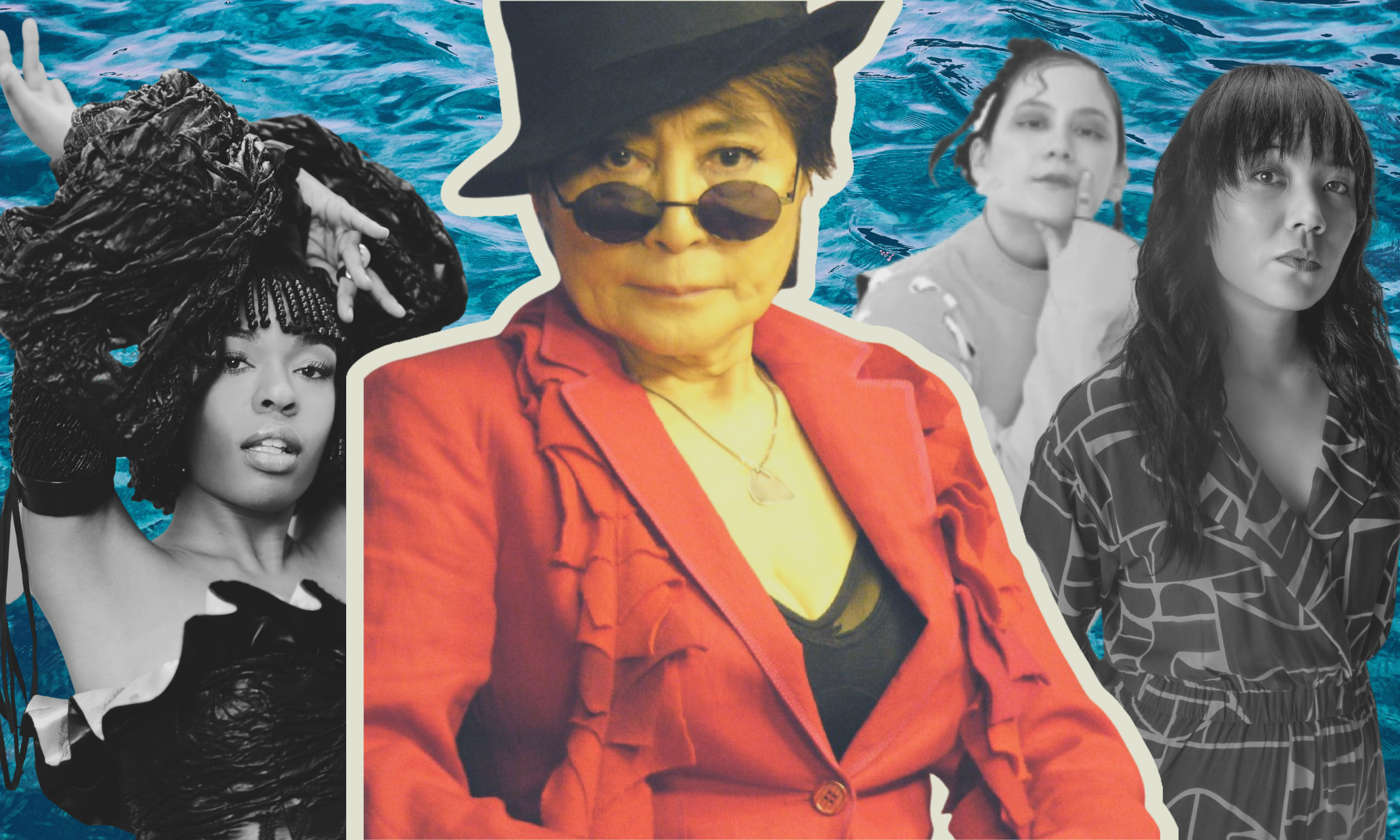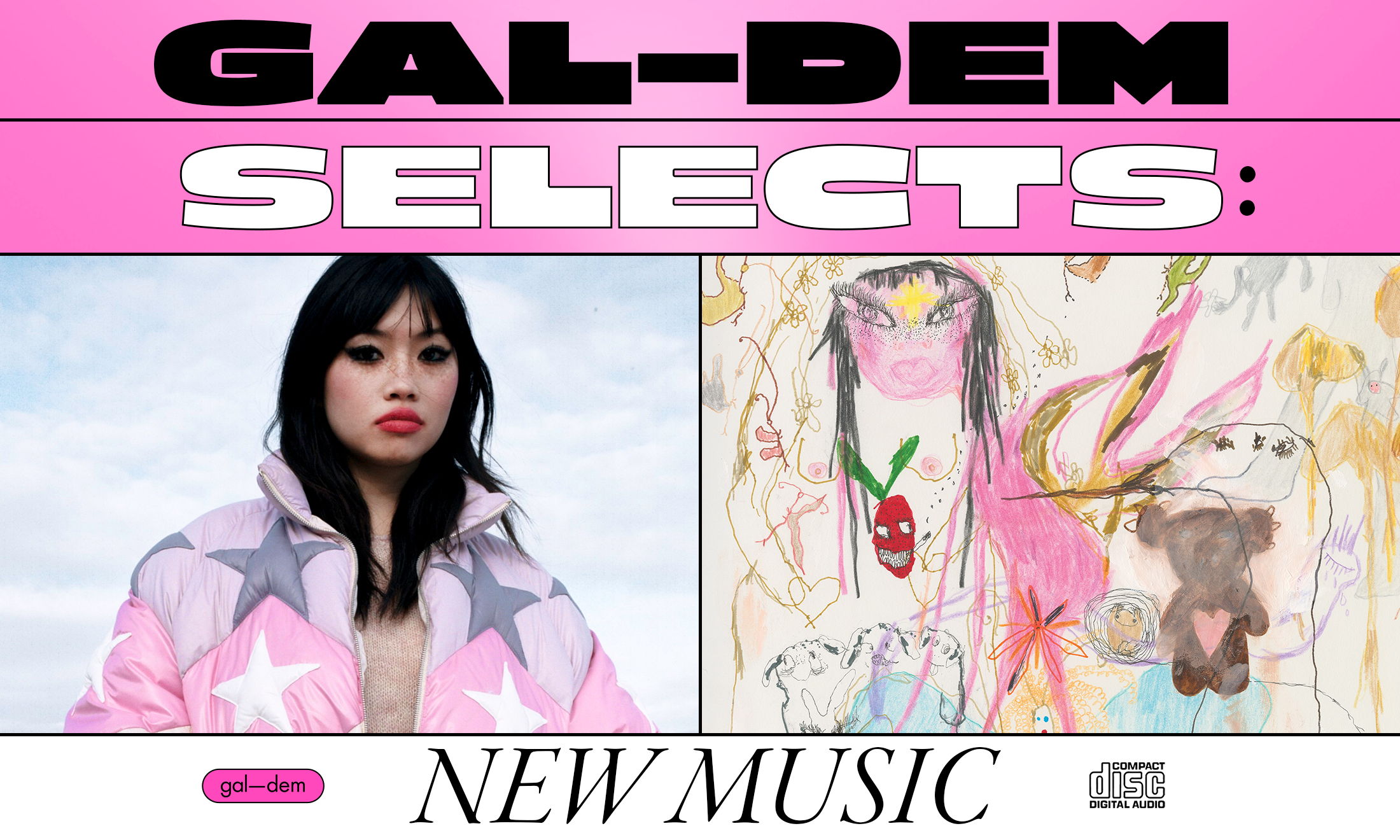
Sudan Archives (c: Alex Black), Yoko Ono (c: Alexander Plyushchev), Japanese Breakfast (c: Peter Ash Lee), Thao (c: Eric Einwiller)
‘Thank you, Yoko Ono’: Japanese Breakfast, Thao and Sudan Archives on the experimental music legend
Following the release of an album celebrating Yoko Ono on her 89th birthday, three artists who contributed to the compilation break down their connection with her work.
Tara Joshi
24 Feb 2022
There’s a running joke about Yoko Ono that her music is inscrutable and difficult to listen to. And sure, the Japanese experimental artist has never been afraid to push boundaries in the realms of dissonant screams and offbeat vocals etc, but none of that detracts from her being an impressive, accomplished artist.
“These are vast songs that tremble and soar with warm, tangible, sometimes raw emotion”
Her name will forever be wrapped up with that of her partner, but Ocean Child: Songs of Yoko Ono, a new album compiled by Ben Gibbard of Death Cab For Cutie in celebration of Yoko Ono’s 89th birthday, is a reminder of the power of her own songwriting. These are vast songs that tremble and soar with warm, tangible, sometimes raw emotion, re-animated by artists like Jay Som, Sharon Van Etten, David Byrne and more.
We spoke to Japanese Breakfast, Thao and Sudan Archives about their beautiful contributions to the Ocean Child record, and their connection to the work of Ms Ono.
Japanese Breakfast
Ben Gibbard sent me an email about this project. I grew up a huge Death Cab for Cutie fan, he’s definitely a hero of mine – and so, when he hit me up about this, I was like, ‘whatever you want!!’. To be honest, I wasn’t super familiar with Yoko Ono’s work as a musician. But it sounded like a really cool project to be a part of. Yoko Oko is one of those musicians that other musicians and cool people whose music taste that you admire are into her catalogue, and so it’s always been one of the things that I’ve wanted to check out.
“I remember at a young age, before I had listened to any of her records or knew much about her, I would say, ‘Yoko Ono was my favourite Beatle'”
I actually think I heard The Apples in Stereo interpretation of ‘Nobody Sees Me Like You Do’ before the original. There’s a really beautiful tubular bell melody on that song. I just really loved that melody line and decided to do it in octaves on the piano. And that title is so striking, it’s like one of the most melodically pleasing songs. I think the title is just such a simple idea that feels quite profound. That’s what love is; it’s someone seeing you in a way that no one else can.
Because of the pandemic, we had such limited studio time and access to musicians, so I thought it would be easiest to just do a stripped down piano song. During the lockdown, I spent a lot of time playing the piano. I started playing the piano when I was five years old, but I never was a very good student and so I think something about the lockdown made me feel like I wanted to just focus on something you know, where if you show up every day you can watch yourself get better. It’s like it gave me a sense of control. And so I opted to cover more of a piano ballad. My own album had been pushed, and so it was really wonderful getting to focus on something at that time. I think it’s really scary to put out a stripped down song that you’ve like produced, played, performed yourself. It’s a lot harder to hide behind that.
“The way that she uses her life in this very profound, vulnerable way is something that’s very inspiring to me”
Yoko is just such a tremendous artist, more than anything. I was reading more about her intention behind all of her artistic decisions, like the cover of Season of Glass being John Lennon’s glasses. The way that she uses her life in this very profound, vulnerable way is something that’s very inspiring to me. She was so unfairly villainised as an artist, as a woman, as a ‘disrupter’ of one of the most beloved bands of all time – like many women attached to great male artists are. I think that that might have been something that I internalised at a young age – that it kind of felt like Asian women were the antithesis of rock and roll; that we were the destroyers of this great rock band. I think that there’s something really exciting about reclaiming that.
I remember at a young age, before I had listened to any of Yoko Ono’s records or knew much about her, that I would say something like, ‘Yoko Ono was my favourite Beatle’. Obviously, as an Asian woman, you kind of side with this person, and I think that from an early age, I probably realised what a misogynistic understanding there was of what her role in all of that was. It does feel cool that the compilation has asked so many Asian women to be a part of it. It’s wonderful to reclaim her as the great musician she is.
Thao
I loved the idea of being part of a greater effort to express appreciation and gratitude for Ms. Ono as a songwriter, and to help draw more attention to her catalog. Many thanks to Ben Gibbard for the invitation! I was a lot more familiar with her work as a multi-media and performance artist. I became aware of her music in the past few years, and am so glad for this opportunity to delve more deeply into her songwriting.
I knew immediately that I wanted to cover ‘Yellow Girl (Stand By for Life)’ and was so glad that it was still available. I wanted very much to sink into the lyrics – her lyrics resonated a great deal and triggered many visceral memories of my experiences as an Asian woman in the music industry and in the world at large. I wanted to interpret the music to hold and express what they set off in me. I tried to capture all that emotion in the production and instrumentation through sharp, dark textures and the dissonant yet melodic tension in the vocals and piano that played off Ms. Ono’s original vocal melodies.
“I love and appreciate her dedication to a lifetime of work that questions what we do to one another, but also believes in our prevailing capacity for peace and kindness”
I’ve always admired and been inspired by Ms. Ono’s interest in breaking down the barrier between the artist, their art, and the audience, and how she so deftly encourages the audience to consider themselves as they consider and participate in her work. I love and appreciate her dedication to a lifetime of work that questions what we do to one another, but also believes in our prevailing (often obscured, sometimes in doubt) humanity and capacity for peace and kindness. It’s so painful to read all the vitriolic drivel that was flung at and around her. Her humour and optimism and drive through derision and closed-mindedness are a comfort and a propulsion.
I’m so honoured to be a part of a body of work that pays tribute to Ms.Ono’s songwriting. Thank you, Yoko Ono.
Sudan Archives
I was drawn to this project because, after research, I found out that she was an experimental musician of her time. I consider myself an experimental musician, and I felt that it would be an honour to pay homage to one of the foremothers of experimental music. I learned that she wasn’t a slave to the use of western vocal tonality. I used to be insecure about my own voice until I studied Francis Bebey and read his book African Music: A People’s Art. While reading, I learned that Yoko Ono is a griot because she is preserving her experience and narrative. I didn’t really know who Yoko Ono was before this. A lot of my friends had posted about her though, and I always thought she seemed really interesting.
“I felt that it would be an honour to pay homage to one of the foremothers of experimental music”
I listened through her records with my boyfriend ALL CITY JIMMY and we chose ‘Dog Town’. I connected with it because it’s a perfect interpretation of how I feel living as a transplant in Los Angeles. He’s from LA and he also told me that parts of Venice were referred to as ‘dog town’, and it had always been a rough place. I was able to resonate with this because in my cover, “dog town” represents hard times that I have experienced.
Her work wasn’t forgotten. What she was creating was not to be compared to a pop band. She will continue to not be forgotten because of her unique perspective and experimental approach to art.
Thank you Yoko Ono for staying true.
Ocean Child: Songs of Yoko Ono is out now. You can listen here.
Like what you’re reading? Our groundbreaking journalism relies on the crucial support of a community of gal-dem members. We would not be able to continue to hold truth to power in this industry without them, and you can support us from £5 per month – less than a weekly coffee.









